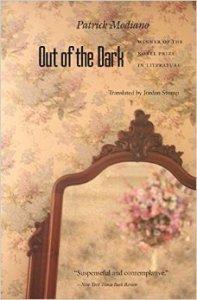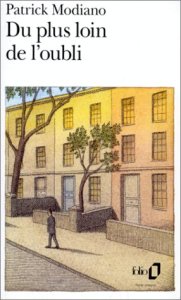‘Out of the Dark’ by Patrick Modiano (1996) – 139 pages Translated by Jordan Stump Grade: B+
What to make of the newest Nobel literary prize winner, Patrick Modiano?
Modiano writes in a clean lucid prose style that is simple for me to enjoy. He writes with the casual easy-going spirit of a Parisian boulevardier who might be sitting at a café table in a Renoir painting. I found ‘Out of the Dark’ a delight.
However readers who like their plots or stories big, crowded, and important will be disappointed. The writing of Patrick Modiano is moody, dream-like, and seemingly inconsequential. His life-long theme has been the shadowy interplay between what we remember and what actually happened.
“I think we still hear in the entrances of buildings echoes of the footsteps of those who used to cross and which have since disappeared. Something continues to vibrate after their passage, waves increasingly weak, but that is captured if one is careful. “
Here is the basic setup of ‘Out of the Dark’. A guy meets a couple on the streets of Paris. The young woman, Jacqueline, spends her time playing pinball at the Café Dante. Her boyfriend Gerard is a small-time gambler. On weekends the couple goes to London to play the roulette tables there and then return to Paris with their winnings. Jacqueline comes up with this scheme to embezzle a suitcase of money from a gambling friend of Gerard’s and take off to the island of Majorca not with Gerard but with our narrator guy. However in mid-trip Jacqueline disappears. Fifteen years later our narrator sees Jacqueline on the streets of Paris. She pretends not to recognize him, but they spend a few hours together. The next day the narrator discovers that Jacqueline and her new husband have suddenly left for Majorca. He doesn’t see Jacqueline again for another fifteen years, and when he does he avoids an encounter with her.
 Not much of a story. Here is what I make of it. When we are young most of us encounter people to whom circumstances bring us very close for a short time in our lives. For a few months or a year these individuals are more central to us than anyone else. But for whatever reason these people drop out of our lives just as quickly as they had arrived. We may or may not encounter them years later, but circumstances have totally changed. Any sense of closeness is gone, and we may just wish to avoid meeting up with them at all again.
Not much of a story. Here is what I make of it. When we are young most of us encounter people to whom circumstances bring us very close for a short time in our lives. For a few months or a year these individuals are more central to us than anyone else. But for whatever reason these people drop out of our lives just as quickly as they had arrived. We may or may not encounter them years later, but circumstances have totally changed. Any sense of closeness is gone, and we may just wish to avoid meeting up with them at all again.
“We had no real qualities, except the one that youth gives to everyone for a very brief time, like a vague promise that will never be kept.”
Apparently all of the novels of Patrick Modiano are like this, French existential noir. He has worked this same shadowy theme in short novels for his entire writing career. I find myself quite attuned to Modiano’s writing style and will definitely be reading more of his novels in the months and years to come.

Posted by roughghosts on January 1, 2015 at 1:47 AM
Sounds right up my alley. This is the most intriguing description of his work I have heard since his Nobel win. I will have to make room for him on impossible monster, the new year’s To Be Read list.
LikeLike
Posted by Anokatony on January 1, 2015 at 6:23 PM
Hi roughghosts,
I’m planning on working in some more Patrick Modiano into my TBR list this year. Modiano looks to be a Nobel prize winner that I really like. There have been a few that I still haven’t read and probably won’t like Dario Fo, J.M.G. de Clezio, and Tomas Transtromer.
LikeLike
Posted by Lisa Hill on January 2, 2015 at 2:31 AM
Actually, Tony I predict that you will like LeClezio. I have enjoyed both of his that I’ve read: Desert and Wandering Star and will happily read anything else that I can find. ( http://anzlitlovers.com/category/who-to-find-here-anz-in-capitals/le-clezio-j-m-g/) I don’t know the other two. I thought Transtromer was a poet…
LikeLike
Posted by Anokatony on January 2, 2015 at 6:22 AM
Hi Lisa,
You’ve convinced me that I need to re-think my too-easy dismissal of J.MG. le Clezio. When he won the award, there was very little of his work available in English, and by the time more had been translated, I had nearly completely forgot about him. Don’t be surprised if I have a review of one of his novels in the near future.
LikeLike
Posted by Lisa Hill on January 2, 2015 at 8:16 AM
Excellent! LOL I am not just an ‘ambassador for Australian Literature’ – I do it for the French as well!
LikeLike
Posted by Lisa Hill on January 1, 2015 at 1:49 AM
Well done, Tony, first of my friends to review a Modiano in English! (Well, not counting Stu from Winston’s Dad who read him *before the Nobel Prize* but who can keep up with Stu for translated fiction, eh?)
I’m not sure if this is the one I pre-ordered or not. I hope it is, it sounds rather interesting.
Happy New Year, and thank you for the hours of pleasure I’ve had reading your blog throughout 2014:)
LikeLike
Posted by Anokatony on January 1, 2015 at 6:30 PM
Hi Lisa,
That is true, we can’t keep up with Stu when it comes to translated fiction.
Modiano is now definitely in my ‘Good’ Nobel prize winner category. There is now a bit of a rush to translate more of his novels, and maybe he is one who will catch on with readers of English. He is supposed to be very popular in France.
Happy New Year to you too, and as always thanks for your comments and insights!
LikeLike
Posted by kaggsysbookishramblings on January 1, 2015 at 12:54 PM
I have “A Search Warrant” lurking and from the look of the first pages it sounds as if the “dreamy-like” quality will be here too. Which I think I will like! 🙂
LikeLike
Posted by Anokatony on January 1, 2015 at 6:34 PM
Hi Kaggsy,
I was a little hesitant to use the term dream-like for Modiano, because it has turned me off when used for other writers. I don’t want readers to think that his books put me to sleep; they are much better than that. 🙂
LikeLiked by 1 person
Posted by Max Cairnduff on January 4, 2015 at 8:54 PM
That sounds great. I wasn’t aware this one was available in English, and it sounds much more interesting than the stuff I was aware of by him. Where did you find it?
LikeLike
Posted by Anokatony on January 5, 2015 at 4:30 AM
Hi Max,
After starting ‘Out of the Dark’, I discovered that it was an obscure translation from the University of Nebraska, but it turned out being a good introduction to Modiano’s style. For my next Modiano I will read one of the more mainstream translations which are coming out now.
LikeLike
Posted by Max Cairnduff on April 20, 2015 at 7:10 PM
I’d completely forgotten this. Thanks for reminding me of it!
LikeLike